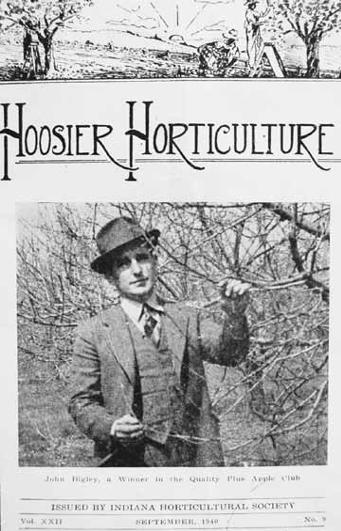Bigley Orchard
Sep 4th, 2018 by John Houghton
John Bigley started the orchard by planting 25 acres of apples and peaches in 1928. In those early years as the fruit matured, John sold bushel baskets in their front lawn. The orchard grew in popularity; John was featured on the cover of the September 1940 issue of Hoosier Horticulture magazine. Over the years the orchard expanded to 65 acres and, at its peak, comprised over 3,000 trees.
In 1947, the first storage building was constructed for orchard operation with two insulated rooms for refrigeration and large doors for truck parking. The storage allowed the apples to be sold from about mid-July to the following April. John’s sons, Bryce and David Bigley. believe that their father was the possibly the first in the United States to pre-package apples.
John started out with a small panel truck, distributing to Culver, Plymouth, Argos, Knox and North Judson. Later, distribution expanded to include a 75 mile radius. By chance, John went to Kentucky to purchase coal at a cheaper price then locally: he took apples with him and ended up selling out. The Bigleys returned to Lexington, selling 100 to 150 bushels as week. Trips to Kentucky continued until the year 2000.
David Bigley officially took over the business in 1970. “He created the popular sales room and added pies, donuts, apple butter made from Bigley apples by nearby Amish cooks, and various fruits and vegtables to the already beloved- apple cider (a family recipe),” editor Jeff Kenney wrote in The Culver Citizen for Sept. 24, 2009.
During the 1980’s business for the Bigley Orchard started to decline. “People do not have time to cook and can get apples from all over the world now, including China, anytime of the year. People only buy a few pounds at a time now,” Bryce said in the Citizen article. The Bigleys were not able to produce massive quantities for large chain groceries. Bryce went on to explain that “There was a big whoop-de-doo about insecticides and the FDA made chemical companies re-label and re-test their products which caused a huge increase in the cost of insecticides.” After continuing to lose money, Bigley Orchard closed in 2000.




